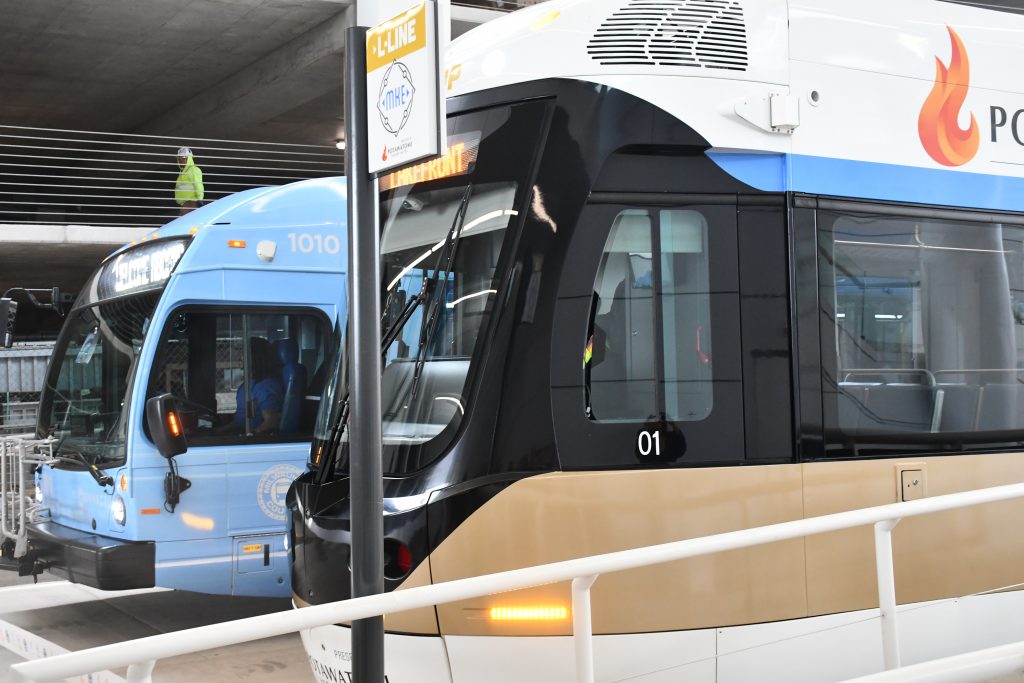Should MCTS Take Over Operation of The Hop, Other Transit Systems?
MCTS officials are considering bidding to operate the systems as a move to create a regional transit authority and financial security.

A Connect 1 battery electric bus (left) and The Hop streetcar vehicle (right) at The Couture transit concourse. Photo by Jeramey Jannene.
Milwaukee County Transit System (MCTS) officials are considering a bold idea to try to grow the system’s financial security, with the end goal being a regional transit authority with dedicated funding — something MCTS has never had.
MCTS officials told the Milwaukee County Board Wednesday that they are looking to bring other transportation systems in-house.
MCTS is considering bidding next year to operate the City of Milwaukee’s streetcar, The Hop, and potentially the City of Waukesha‘s fixed-route bus system, Julie Esch, MCTS deputy director told the county board’s Committee on Transportation, Transit and Public Works. The system is even interested in operating FlexRide, a relatively new city-to-suburbs, job-focused transit service that is funded by the state and led by the nonprofit MobiliSE.
“Not to own the asset, but to manage it,” Esch said of the strategy.
The end goal for the transit system is a regional transit authority (RTA), explained MCTS Managing Director Denise Wandke. An RTA is attractive to MCTS officials because it would bring with it a dedicated source of funding.
“I feel that we should look at different ways that we can incorporate some of these other mobility type of things in order to qualify for an RTA or to find additional funding,” Wandke said. “Just being a fixed route service doesn’t necessarily make us as attractive as, maybe, taking in paratransit — instead of having it as an outsourced, another contract.”
However, the transit system has not yet committed to this course of action.
“It’s certainly worth considering the potential benefits that may result from centralizing public transit throughout Milwaukee County, which may include MCTS bidding to operate The Hop in the future,” the transit system told Urban Milwaukee in a statement.
Mayor Cavalier Johnson‘s administration is open discussing potential new partnerships around transit and transportation, said Jeff Fleming, the mayor’s communications director.
“If we are going to grow Milwaukee and strengthen our economic competitiveness as a metro area, we will need a strong and robust public transit system,” Fleming said. “Whether that should take the form of a formal regional transit authority, mutually-beneficial operating agreements, or other approaches is worth exploring and discussing, including how different options could support the operation and expansion of The Hop.”
The city currently contracts with TransDev to operate the system.
For FlexRide, the top priority right now is securing long-term, sustainable funding, said Dave Steele, executive director of MobiliSE.
“MCTS has been a key partner in helping grow FlexRide, and we’ve always sought to add to the transportation service options of MCTS rather than detract from them. It makes sense for us to further explore our partnership with MCTS since FlexRide is essentially an extension of MCTS’s fixed route service,” Steele said. “MCTS and MobiliSE are in the early stages of exploring what that might look like.
Transit system officials are interested in exploring the creation of a multi-modal transit system, Wandke said, adding, “And I feel that we’re the best in the city and in the state to do that.”
If MCTS ultimately pursues a strategy with an end goal of an RTA, funding, or lack thereof, will be the primary motivation.
The transit system has a long-term structural budget deficit created by an imbalance between the cost to run the system and the funding available to run it. When the COVID-19 pandemic hit, the system was infused with millions in federal stimulus funding. MCTS has used this funding to fill the holes in its budget since 2020. But in 2027, when those funds run out, it faces a $12.6 million budget deficit, according to projections by the Office of the Comptroller. Such a deficit would likely require MCTS to cut entire bus routes.
The state legislature recently placed transit funding for the county in a precarious position.
In 2023, Republican state legislators moved state funding for public transit out of the segregated Transportation Fund and into the General Purpose Revenue Fund. The move places mass transit funding in direct competition with other budget priorities, potentially setting it up for future cuts.
But newly drawn legislative maps may change the political landscape at the state capital after the next election. A goal of the county’s lobbying during the next legislative session will be to have mass transit funding moved back into the general transportation fund, Esch said.
Since 2011, the state has already made cuts to mass transit funding. Even without the cuts transit aid has not been pegged to inflation, which the Wisconsin Public Transportation Association (WIPTA) estimates has amounted to lost revenue equivalent to a 20% cut.
This is why MCTS officials are considering growing the agency and making it more attractive to state and federal policymakers as an RTA, Wandke told supervisors.
“We’re one of the very few systems of our size that don’t have dedicated funding,” Wandke said.
County Executive David Crowley “supports pursuing new public transit options in Milwaukee County and across Southeastern Wisconsin,” said Jonathan Fera, the county executive’s communications director.
“While there are currently no formal plans for establishing and/or lobbying for a Regional Transit Authority, the County Executive will continue seeking out additional funding from state and federal partners to address budget deficits and deferred maintenance for transit facilities, add new buses and shelters to MCTS routes, and provide a wide range of public transportation options for Milwaukee County residents,” Fera said. “MCTS is also pursuing various paths to stay solvent.”
More than a decade ago, the state legislature almost created a regional transit authority for southeastern Wisconsin. In 2009 — the first time the state considered a Kenosha-Racine-Milwaukee (KRM) commuter rail line — an RTA was created for the project. It was later dissolved in 2011 after Republicans took power in the state legislature and, along with then-newly elected Gov. Scott Walker, killed the KRM proposal.
However, at the same time the KRM was considered, the legislature also nearly created a regional transit authority that would have included MCTS. But disunity among Milwaukee County Democrats sunk the bill in the assembly, with a few local representatives breaking from their party. Two of them, David Cullen and Anthony Staskunas, would later run for the county board after losing their seats to partisan redistricting.
The transit system has already found some success with regionalization through its new fare collection system: WisGo. Bringing multiple transit systems under the same fare collection system allows users to use the same mobile applications or fare cards in each system. Four other transit systems have either joined or committed to join WisGO, according to Tim Hosch, MCTS CFO. The City of Waukesha’s Metro Transit joined in 2023, and transit systems in Racine, Beloit and Oshkosh have also committed to joining the system.
Thomas Stawicki, legislative director for Amalgamated Transit Union Local 998, said ATU locals have discussed pushing RTAs as an issue heading into the next state biennial budget process.
“We’re kind of skeptical because over the last 10-15 years, it’s always been shut down,” he said. “But the political atmosphere in Madison has seemed to cool a little bit.”
At the state level, the discussion of an RTA for MCTS and other transit systems is still only speculation, said Sup. Justin Bielinski, a freshman member of the board who also serves as communications director for State Sen. Chris Larson.
“It’s mostly people on our side saying like, ‘Well, you know, with fair maps, these things are maybe on the table.'”
Bielinski remains skeptical, because of the Republican-controlled legislature’s strong opposition to dedicated funding for transit and other non-freeway transportation projects, like rail transit. The supervisor said he would be all on board for an RTA and dedicated transit funding, lamenting the routes MCTS has had to cut over the years for lack of funding.
“It’s just amazing to think about what we could have, versus what we do have,” said Bielinski.
If you think stories like this are important, become a member of Urban Milwaukee and help support real, independent journalism. Plus you get some cool added benefits.
Political Contributions Tracker
Displaying political contributions between people mentioned in this story. Learn more.
- June 30, 2016 - David Crowley received $100 from David Cullen
- August 13, 2015 - Cavalier Johnson received $25 from David Crowley
MKE County
-
Fellow Judge Testifies in Dugan Case
 Dec 16th, 2025 by Graham Kilmer
Dec 16th, 2025 by Graham Kilmer
-
Key Questions in Dugan Trial Take Shape on First Day
 Dec 15th, 2025 by Graham Kilmer
Dec 15th, 2025 by Graham Kilmer
-
FTA Tells Milwaukee to Crack Down on Fare Evasion — Even Where Fares Don’t Exist
 Dec 12th, 2025 by Graham Kilmer
Dec 12th, 2025 by Graham Kilmer
Transportation
-
Congestion Pricing Cuts Air Pollution in New York City
 Dec 14th, 2025 by Jeff Wood
Dec 14th, 2025 by Jeff Wood
-
FTA Tells Milwaukee to Crack Down on Fare Evasion — Even Where Fares Don’t Exist
 Dec 12th, 2025 by Graham Kilmer
Dec 12th, 2025 by Graham Kilmer
-
Will GOGO’s Bus Service Ever Get Going?
 Dec 9th, 2025 by Jeramey Jannene
Dec 9th, 2025 by Jeramey Jannene





















I would be concerned if such an RTA would have the expertise to operate our streetcar well. The streetcar has many different characteristics and strengths as a transportation mode that is very different than buses. The streetcar is not “just another bus.” Without this deep knowledge and understanding, an RTA could result in a streetcar system that doesn’t reach its potential.
I would give MCTS a “barely passable” grade since its elimination of the Gold Line and inception of these electric buses and the Connect 1 line. Those dependent on public transit find it much more difficult to get around. I would hate MCTS to work its magic on the streetcar. Milwaukee Co.’s public transit has enough issues without another debacle.
MCTS currently lacks accountability and meaningful oversight. Transit services in Milwaukee County will continue to decline if transit is allowed to stay within the Milwaukee County echo chamber. The Milwaukee County Board of Supervisors does not have the capacity to oversee transit. They lack exppertise and sophistication, and the County Exec is too far removed. Transit leadership is allowed to do and not do whatever they like. I think transit should focus on whats in front of them before they start running other service. Waukesha knows this and rejected their low bid for Waukesha transit services. Milwaukee should do the same regarding the streetcar.